stop start YAMAHA TRACER 900 GT 2021 User Guide
[x] Cancel search | Manufacturer: YAMAHA, Model Year: 2021, Model line: TRACER 900 GT, Model: YAMAHA TRACER 900 GT 2021Pages: 116, PDF Size: 4.35 MB
Page 59 of 116
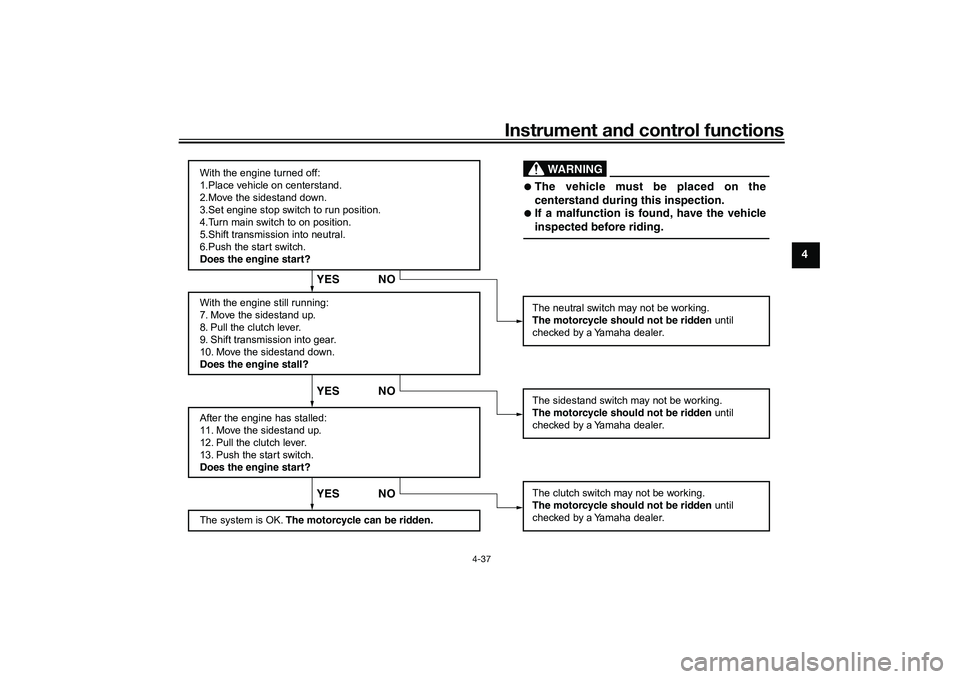
Instrument and control functions
4-37
4
With the engine turned off:
1.Place vehicle on centerstand.
2.Move the sidestand down.
3.Set engine stop switch to run position.
4.Turn main switch to on position.
5.Shift transmission into neutral.
6.Push the start switch.
Does the engine start?
With the engine still running:
7. Move the sidestand up.
8. Pull the clutch lever.
9. Shift transmission into gear.
10. Move the sidestand down.
Does the engine stall?
After the engine has stalled:
11. Move the sidestand up.
12. Pull the clutch lever.
13. Push the start switch.
Does the engine start?
The system is OK. The motorcycle can be ridden.
YES NO YES NO YES NO
The neutral switch may not be working.
The motorcycle should not be ridden until
checked by a Yamaha dealer.
The clutch switch may not be working.
The motorcycle should not be ridden until
checked by a Yamaha dealer.The sidestand switch may not be working.
The motorcycle should not be ridden until
checked by a Yamaha dealer.
WARNING
The vehicle must be placed on the
centerstand during this inspection.
If a malfunction is found, have the vehicle
inspected before riding.
UBAPE0E0.book Page 37 Thursday, December 24, 2020 9:14 AM
Page 64 of 116
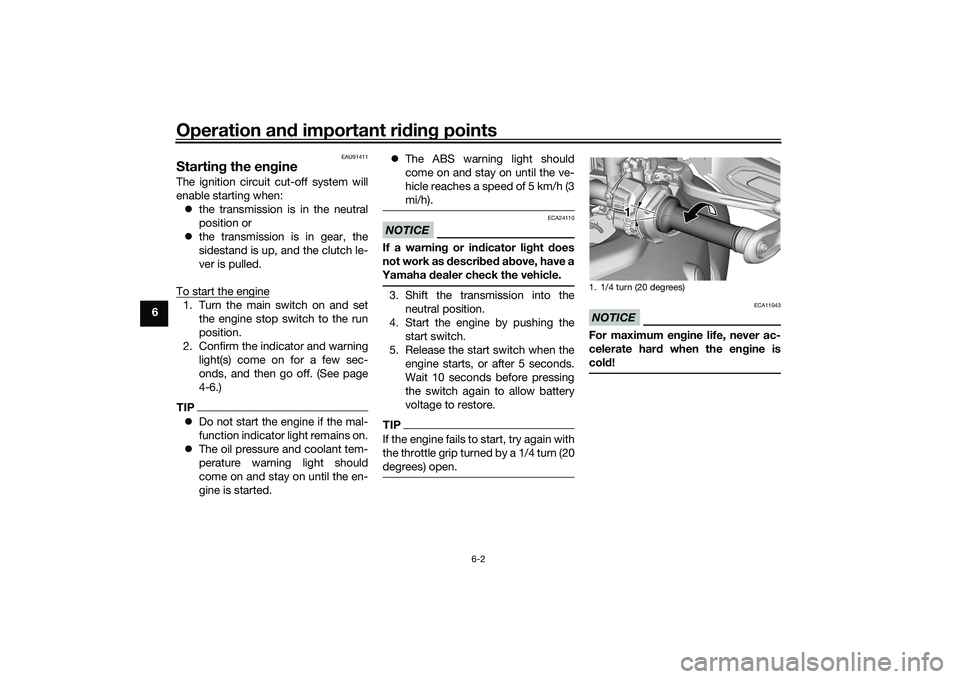
Operation and important rid ing points
6-2
6
EAU91411
Startin g the eng ineThe ignition circuit cut-off system will
enable starting when:
the transmission is in the neutral
position or
the transmission is in gear, the
sidestand is up, and the clutch le-
ver is pulled.
To start the engine1. Turn the main switch on and set the engine stop switch to the run
position.
2. Confirm the indicator and warning light(s) come on for a few sec-
onds, and then go off. (See page
4-6.)TIPDo not start the engine if the mal-
function indicator light remains on.
The oil pressure and coolant tem-
perature warning light should
come on and stay on until the en-
gine is started.
The ABS warning light should
come on and stay on until the ve-
hicle reaches a speed of 5 km/h (3
mi/h).
NOTICE
ECA24110
If a warnin g or in dicator li ght does
not work as d escribed a bove, have a
Yamaha dealer check the vehicle.3. Shift the transmission into the
neutral position.
4. Start the engine by pushing the start switch.
5. Release the start switch when the engine starts, or after 5 seconds.
Wait 10 seconds before pressing
the switch again to allow battery
voltage to restore.TIPIf the engine fails to start, try again with
the throttle grip turned by a 1/4 turn (20
degrees) open.
NOTICE
ECA11043
For maximum en gine life, never ac-
celerate har d when the en gine is
col d!1. 1/4 turn (20 degrees)
1 1 1
UBAPE0E0.book Page 2 Thursday, December 24, 2020 9:14 AM
Page 65 of 116
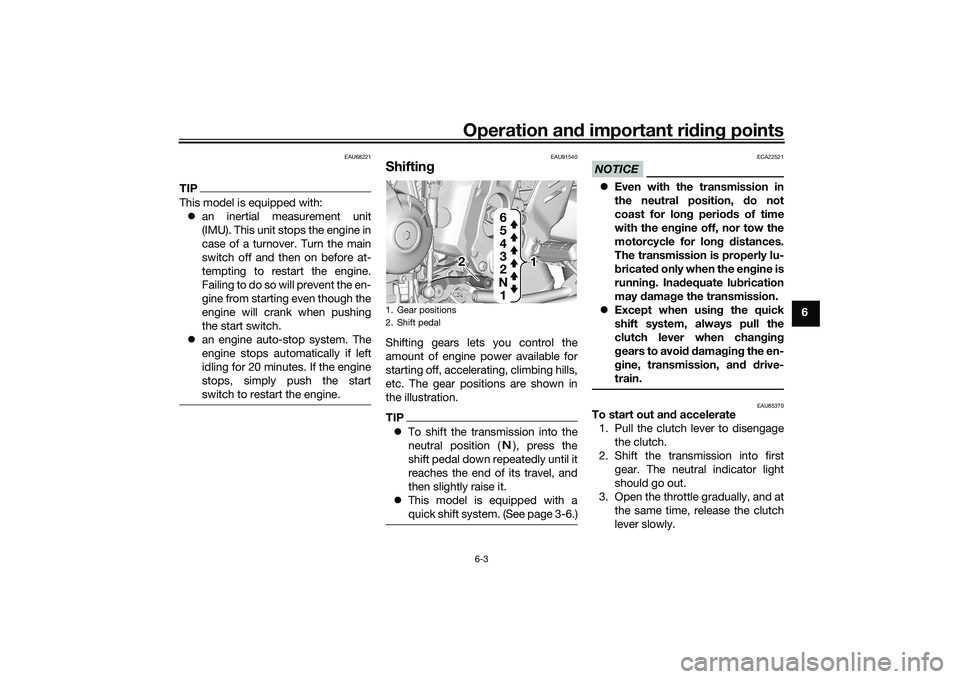
Operation and important ri din g points
6-3
6
EAU68221
TIPThis model is equipped with:
an inertial measurement unit
(IMU). This unit stops the engine in
case of a turnover. Turn the main
switch off and then on before at-
tempting to restart the engine.
Failing to do so will prevent the en-
gine from starting even though the
engine will crank when pushing
the start switch.
an engine auto-stop system. The
engine stops automatically if left
idling for 20 minutes. If the engine
stops, simply push the start
switch to restart the engine.
EAU91540
Shiftin gShifting gears lets you control the
amount of engine power available for
starting off, accelerating, climbing hills,
etc. The gear positions are shown in
the illustration.TIPTo shift the transmission into the
neutral position ( ), press the
shift pedal down repeatedly until it
reaches the end of its travel, and
then slightly raise it.
This model is equipped with a
quick shift system. (See page 3-6.)
NOTICE
ECA22521
Even with the transmission in
the neutral position, d o not
coast for lon g period s of time
with the en gine off, nor tow the
motorcycle for long d istances.
The transmission is properly lu-
b ricated only when the en gine is
running . Inadequate lu brication
may damag e the transmission.
Except when usin g the quick
shift system, always pull the
clutch lever when chan gin g
g ears to avoi d d amag ing the en-
g ine, transmission, an d drive-
train.
EAU85370
To start out an d accelerate
1. Pull the clutch lever to disengage the clutch.
2. Shift the transmission into first gear. The neutral indicator light
should go out.
3. Open the throttle gradually, and at the same time, release the clutch
lever slowly.
1. Gear positions
2. Shift pedal
2 2 2
1 1
1
N 2 3
4
5
6
UBAPE0E0.book Page 3 Thursday, December 24, 2020 9:14 AM
Page 66 of 116
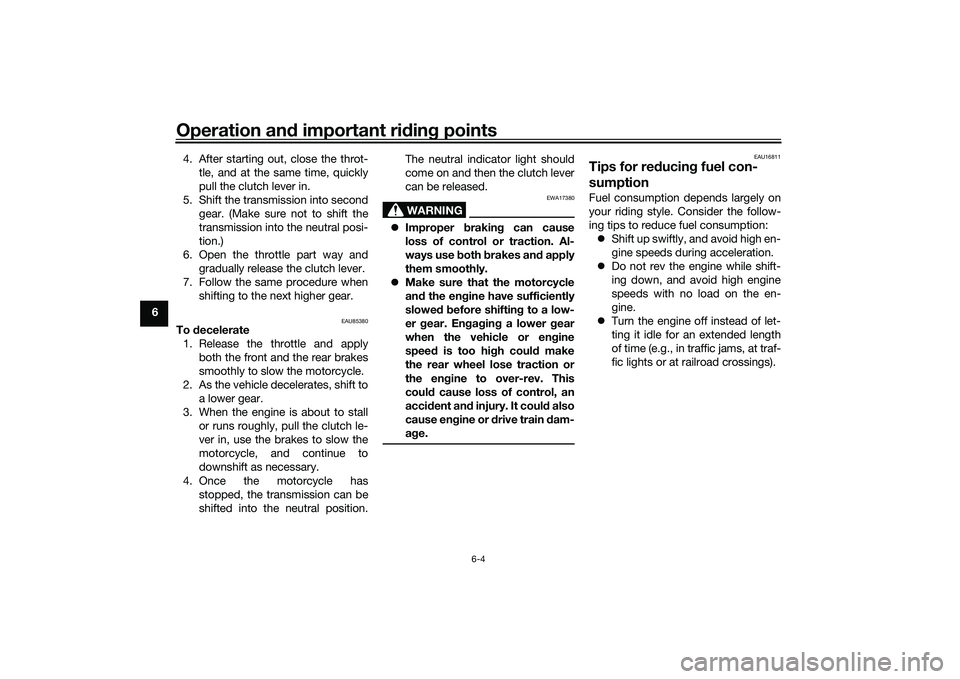
Operation and important rid ing points
6-4
6 4. After starting out, close the throt-
tle, and at the same time, quickly
pull the clutch lever in.
5. Shift the transmission into second gear. (Make sure not to shift the
transmission into the neutral posi-
tion.)
6. Open the throttle part way and gradually release the clutch lever.
7. Follow the same procedure when shifting to the next higher gear.
EAU85380
To decelerate
1. Release the throttle and apply both the front and the rear brakes
smoothly to slow the motorcycle.
2. As the vehicle decelerates, shift to a lower gear.
3. When the engine is about to stall or runs roughly, pull the clutch le-
ver in, use the brakes to slow the
motorcycle, and continue to
downshift as necessary.
4. Once the motorcycle has stopped, the transmission can be
shifted into the neutral position. The neutral indicator light should
come on and then the clutch lever
can be released.
WARNING
EWA17380
Improper brakin g can cause
loss of control or traction. Al-
ways use b oth brakes an d apply
them smoothly.
Make sure that the motorcycle
and the en gine have sufficiently
slowe d b efore shiftin g to a low-
er gear. En gag in g a lower gear
when the vehicle or en gine
speed is too hi gh coul d make
the rear wheel lose traction or
the en gine to over-rev. This
coul d cause loss of control, an
acci dent an d injury. It coul d also
cause en gine or drive train dam-
a g e.
EAU16811
Tips for re ducin g fuel con-
sumptionFuel consumption depends largely on
your riding style. Consider the follow-
ing tips to reduce fuel consumption:
Shift up swiftly, and avoid high en-
gine speeds during acceleration.
Do not rev the engine while shift-
ing down, and avoid high engine
speeds with no load on the en-
gine.
Turn the engine off instead of let-
ting it idle for an extended length
of time (e.g., in traffic jams, at traf-
fic lights or at railroad crossings).
UBAPE0E0.book Page 4 Thursday, December 24, 2020 9:14 AM
Page 78 of 116
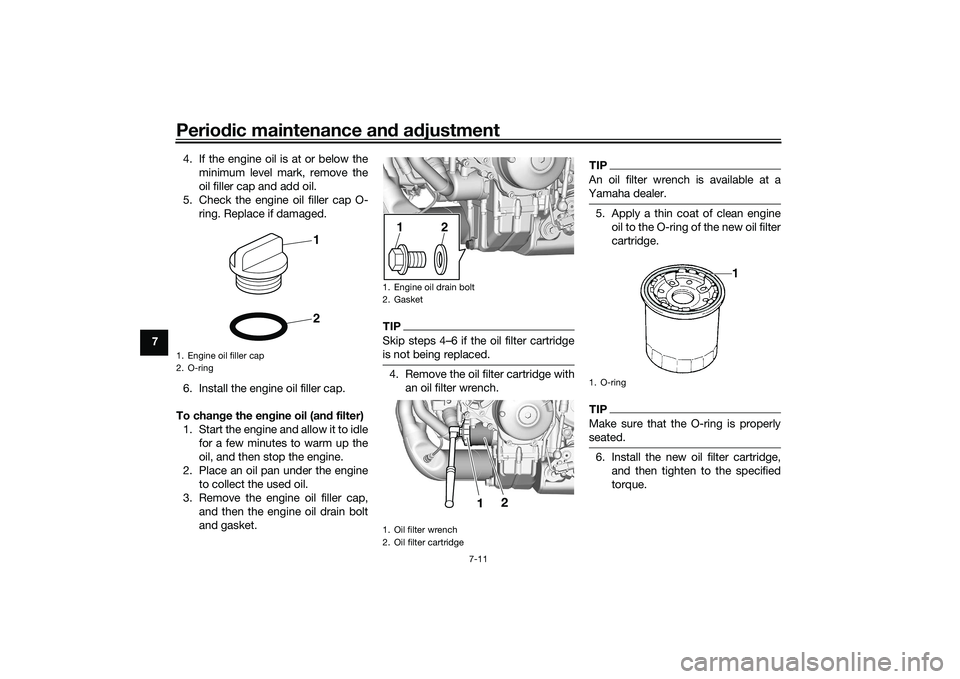
Periodic maintenance an d a djustment
7-11
7 4. If the engine oil is at or below the
minimum level mark, remove the
oil filler cap and add oil.
5. Check the engine oil filler cap O- ring. Replace if damaged.
6. Install the engine oil filler cap.
To chan ge the en gine oil (an d filter)
1. Start the engine and allow it to idle for a few minutes to warm up the
oil, and then stop the engine.
2. Place an oil pan under the engine to collect the used oil.
3. Remove the engine oil filler cap, and then the engine oil drain bolt
and gasket.
TIPSkip steps 4…6 if the oil filter cartridge
is not being replaced.4. Remove the oil filter cartridge withan oil filter wrench.
TIPAn oil filter wrench is available at a
Yamaha dealer.5. Apply a thin coat of clean engine oil to the O-ring of the new oil filter
cartridge.TIPMake sure that the O-ring is properly
seated.6. Install the new oil filter cartridge,and then tighten to the specified
torque.
1. Engine oil filler cap
2. O-ring
21
1. Engine oil drain bolt
2. Gasket
1. Oil filter wrench
2. Oil filter cartridge
1
2
1
2
1. O-ring
UBAPE0E0.book Page 11 Thursday, December 24, 2020 9:14 AM
Page 79 of 116
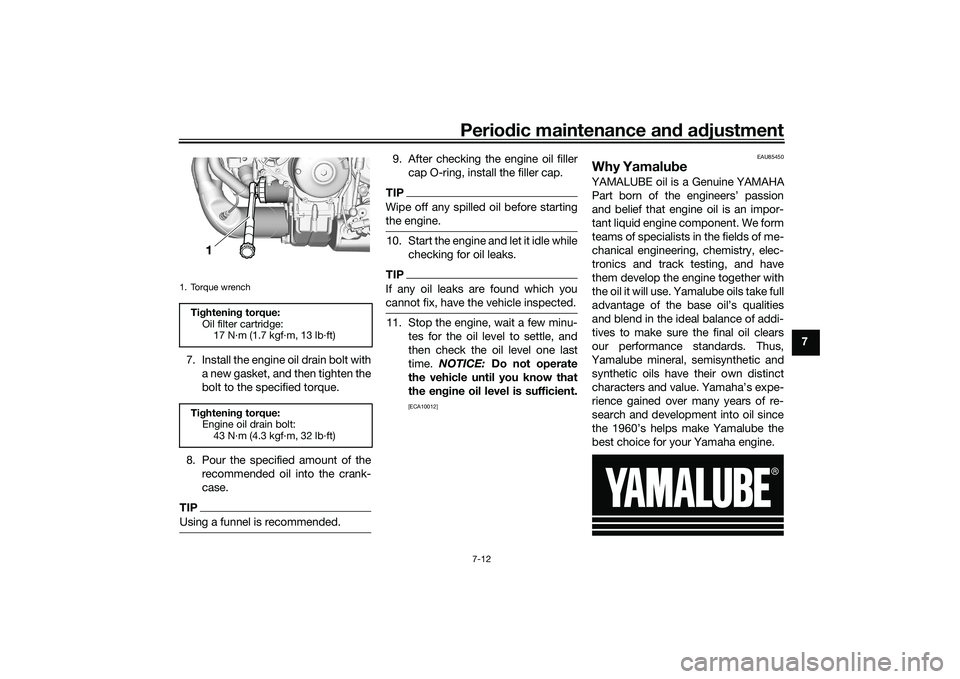
Periodic maintenance an d a djustment
7-12
7
7. Install the engine oil drain bolt with a new gasket, and then tighten the
bolt to the specified torque.
8. Pour the specified amount of the recommended oil into the crank-
case.
TIPUsing a funnel is recommended.
9. After checking the engine oil fillercap O-ring, install the filler cap.TIPWipe off any spilled oil before starting
the engine.10. Start the engine and let it idle while checking for oil leaks.TIPIf any oil leaks are found which you
cannot fix, have the vehicle inspected.11. Stop the engine, wait a few minu-tes for the oil level to settle, and
then check the oil level one last
time. NOTICE: Do not operate
the vehicle until you know that
the en gine oil level is sufficient.
[ECA10012] EAU85450
Why Yamalu
beYAMALUBE oil is a Genuine YAMAHA
Part born of the engineers’ passion
and belief that engine oil is an impor-
tant liquid engine component. We form
teams of specialists in the fields of me-
chanical engineering, chemistry, elec-
tronics and track testing, and have
them develop the engine together with
the oil it will use. Yamalube oils take full
advantage of the base oil’s qualities
and blend in the ideal balance of addi-
tives to make sure the final oil clears
our performance standards. Thus,
Yamalube mineral, semisynthetic and
synthetic oils have their own distinct
characters and value. Yamaha’s expe-
rience gained over many years of re-
search and development into oil since
the 1960’s helps make Yamalube the
best choice for your Yamaha engine.
1. Torque wrenchTi ghtenin g torque:
Oil filter cartridge: 17 N·m (1.7 kgf·m, 13 lb·ft)
Ti ghtenin g torque:
Engine oil drain bolt:
43 N·m (4.3 kgf·m, 32 lb·ft)
1
UBAPE0E0.book Page 12 Thursday, December 24, 2020 9:14 AM
Page 100 of 116
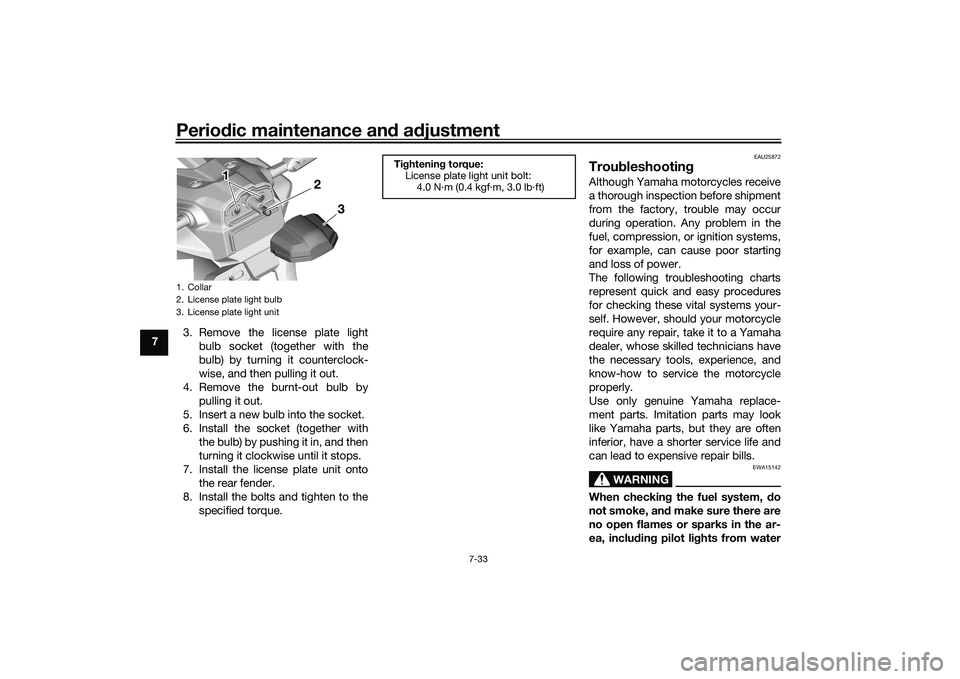
Periodic maintenance an d a djustment
7-33
7 3. Remove the license plate light
bulb socket (together with the
bulb) by turning it counterclock-
wise, and then pulling it out.
4. Remove the burnt-out bulb by pulling it out.
5. Insert a new bulb into the socket.
6. Install the socket (together with the bulb) by pushing it in, and then
turning it clockwise until it stops.
7. Install the license plate unit onto the rear fender.
8. Install the bolts and tighten to the specified torque.
EAU25872
Trou bleshootin gAlthough Yamaha motorcycles receive
a thorough inspection before shipment
from the factory, trouble may occur
during operation. Any problem in the
fuel, compression, or ignition systems,
for example, can cause poor starting
and loss of power.
The following troubleshooting charts
represent quick and easy procedures
for checking these vital systems your-
self. However, should your motorcycle
require any repair, take it to a Yamaha
dealer, whose skilled technicians have
the necessary tools, experience, and
know-how to service the motorcycle
properly.
Use only genuine Yamaha replace-
ment parts. Imitation parts may look
like Yamaha parts, but they are often
inferior, have a shorter service life and
can lead to expensive repair bills.
WARNING
EWA15142
When checkin g the fuel system, do
not smoke, an d make sure there are
no open flames or sparks in the ar-
ea, inclu din g pilot li ghts from water
1. Collar
2. License plate light bulb
3. License plate light unit
3
2
1 1 1
Ti
ghtenin g torque:
License plate light unit bolt:
4.0 N·m (0.4 kgf·m, 3.0 lb·ft)
UBAPE0E0.book Page 33 Thursday, December 24, 2020 9:14 AM
Page 103 of 116
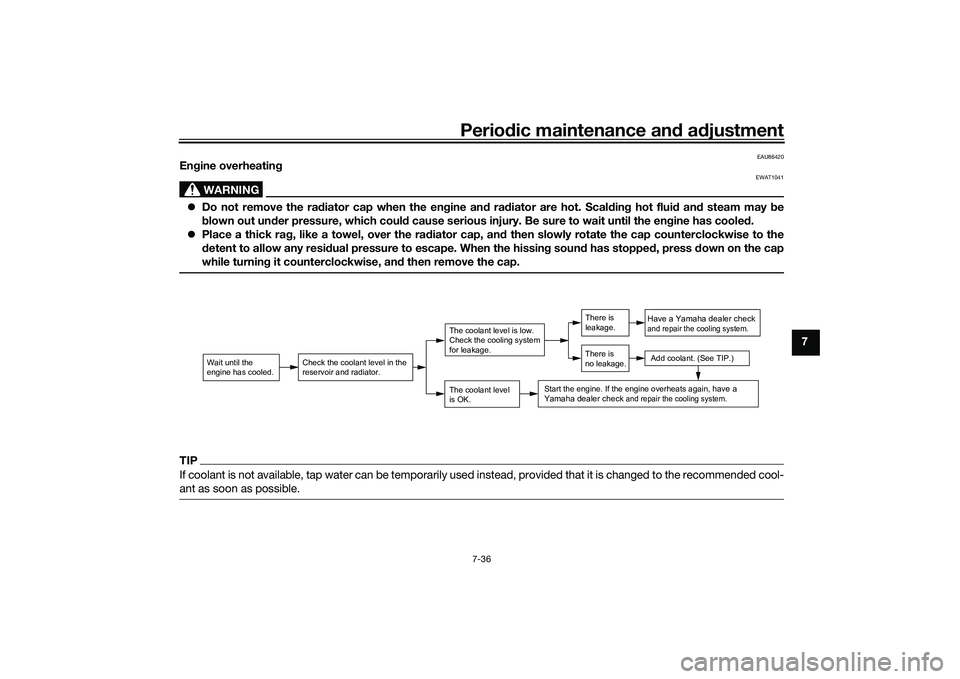
Periodic maintenance an d a djustment
7-36
7
EAU86420
En gine overheatin g
WARNING
EWAT1041
Do not remove the ra diator cap when the en gine an d ra diator are hot. Scal din g hot flui d an d steam may be
b lown out un der pressure, which coul d cause serious injury. Be sure to wait until the en gine has coole d.
Place a thick rag , like a towel, over the ra diator cap, an d then slowly rotate the cap counterclockwise to the
d etent to allow any resi dual pressure to escape. When the hissin g soun d has stopped , press down on the cap
while turnin g it counterclockwise, an d then remove the cap.TIPIf coolant is not available, tap water can be temporarily used instead, provided that it is changed to the recommended cool-
ant as soon as possible.
Wait until the
engine has cooled.
Check the coolant level in the
reservoir and radiator.
The coolant level
is OK.The coolant level is low.
Check the cooling system
for leakage.
Have a Yamaha dealer checkand repair the cooling system.Add coolant. (See TIP.)
Start the engine. If the engine overheats again,
have a
Yamaha dealer check
and repair the cooling system.
There is
leakage.
There is
no leakage.
UBAPE0E0.book Page 36 Thursday, December 24, 2020 9:14 AM
Page 114 of 116
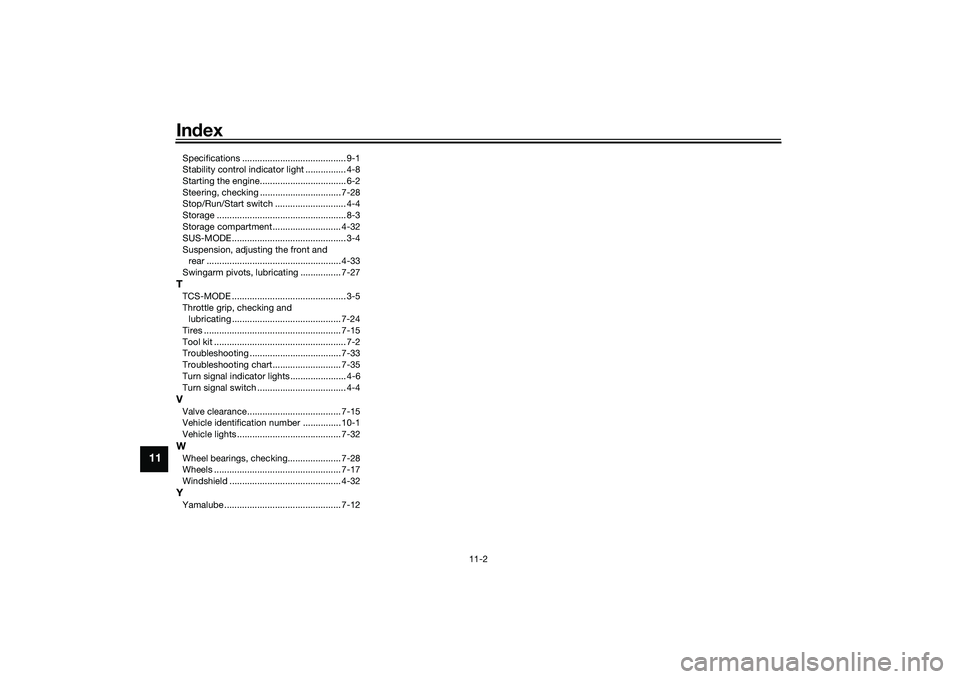
Index
11-2
11
Specifications ......................................... 9-1
Stability control indicator light ................ 4-8
Starting the engine.................................. 6-2
Steering, checking ................................ 7-28
Stop/Run/Start switch ............................ 4-4
Storage ................................................... 8-3
Storage compartment ........................... 4-32
SUS-MODE............................................. 3-4
Suspension, adjusting the front and rear ..................................................... 4-33
Swingarm pivots, lubricating ................ 7-27TTCS-MODE ............................................. 3-5
Throttle grip, checking and lubricating ........................................... 7-24
Tires ...................................................... 7-15
Tool kit .................................................... 7-2
Troubleshooting .................................... 7-33
Troubleshooting chart........................... 7-35
Turn signal indicator lights ...................... 4-6
Turn signal switch ................................... 4-4VValve clearance..................................... 7-15
Vehicle identification number ............... 10-1
Vehicle lights ......................................... 7-32WWheel bearings, checking..................... 7-28
Wheels .................................................. 7-17
Windshield ............................................ 4-32YYamalube .............................................. 7-12
UBAPE0E0.book Page 2 Thursday, December 24, 2020 9:14 AM